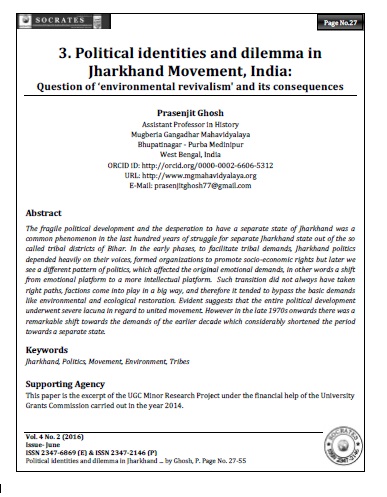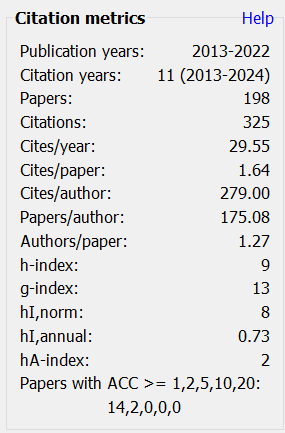Political identities and dilemma in Jharkhand Movement, India
Question of ‘environmental revivalism' and its consequences
Keywords:
Jharkhand, Politics, Movement, Environment, TribesAbstract
The fragile political development and the desperation to have a separate state of Jharkhand was a common phenomenon in the last hundred years of struggle for separate Jharkhand state out of the so called tribal districts of Bihar. In the early phases, to facilitate tribal demands, Jharkhand politics depended heavily on their voices, formed organizations to promote socio-economic rights but later we see a different pattern of politics, which affected the original emotional demands, in other words a shift from emotional platform to a more intellectual platform. Such transition did not always have taken right paths, factions come into play in a big way, and therefore it tended to bypass the basic demands like environmental and ecological restoration. Evident suggests that the entire political development underwent severe lacuna in regard to united movement. However in the late 1970s onwards there was a remarkable shift towards the demands of the earlier decade which considerably shortened the period towards a separate state.
Downloads
Metrics
References
File No- 270/1947, Sub: Adivasi Movement: Activities of Jaipal Singh and Others. BSA
File No- 270 (3)/1947, Sub: Formation of Jharkhand Momin Union to work for the separation of Jharkhand. BSA
File No- 1815/1947, Sub: Activities of the Christian Missionary society in Chotnagpur and the Santal Parganas in connection with the adivasi agitator, policy to be adopted towards them. BSA
Basu, Sajal.( 1994) Jharkhand Movement, Ethnicity and Culture of Silence.Simla, IIAS. Ouoted from Jharkhander Bidroho o Jiban, by P.P.Mahato. Calcutta, 1982.
Corbridge, Stuart. (2005).The Ideology of Tribal Economy and Society, Politics in Jharkhand, C1950-1980. In Sarah Jewitt, Sanjay Kumar, Stuart Corbridge (Eds.) Jharkhand: environment, Development, Ethnicity. New Delhi, Oxford University Press.
Damodaran, Vinita. (October 1997). Environment, Ethnicity and History in Chotanagpur, India,1850-1970. Enviornment and History, JSTOR 3(3). URL http//www.jstor.org stable/20723049 accessed on 02.09.2013
Ghosh, Arunabha. (1998). Jharkhand Movement, A Study in the Politics of Regionalism. Calcutta. Minerva Associates (publications) Pvt. Ltd.
Jewitt, Sarah. (2008). Political Ecology of Jharkhand Conflicts. Asia Pacific View Point, 49(1), 68-72.
Singh.K.S. ( 2004) Ecology, Ethnicity. Regionalism and State Formation: An Exploration of the Jharkhand Movement. In Rajib Balakrishnan (Eds.) Jharkhand Matters : Essays on Ethnicity, Regionalism and Development in India, New Delhi, Konark.
Kujur, Ignes.(2003) Jharkhand Betrayed. In Ram Dayal Munda & S.Bosu Mullick (Eds.) The Jharkhand Movement : Indigenous Peoples Struggle for Autonomy in India, Copenhegen, IWGIA.
Mishra, Asha. (2010). Indigenous Movement for a Seperate State-Jharkhand During The Twentieth Century. In Asha Mishra & Chittaranjan Kumar Paty (Eds.) Tribal Movements in Jharkhand, 1857-2007, New Delhi, Concept Publishing Company Pvt. Ltd.
Mullick, S.Bosu. (2007). State Forest policy and Adivasi Selfrule in Jharkhand. In Chittaranjan Kumar Paty (Eds.) Forest, Government and Tribe, New Delhi: Concept Publishing Company Pvt. Ltd.
Pathak, Akhileshwar. (1994). Contested Domains, The State, Peasants and Forests in Contemporary India. New Delhi, Sage.
Munda, R.D, Mullick, S.Bosu (2003). The Jharkhand Movement, Indigenous Peoples Struggle for Autonomy in India. IWGIA.
Narayan, S. (1988). Movement, Development, Police and Judiciary in Tribal World. New Delhi, Inter India.
Report of Committee on Jharkhand Matters. May,1990.
Ekka,William, & Sinha, R.K. (2004). Documentation of Jharkhand Movement. Kolkata, Anthropological Survey of India.
Gadgill, Madhav. (1989). Deforestation, Problems and Prospects. Society for Promotion of Waste land Development. URL www.ces.ennet.in/biodiversity/sdev/mg/pdfs/mg087.doc.
Keshari B.P, Munda, R.D. (2003). Recent Development in Jharkhand Movement. In R.D.Munda & S.Bosu Mullick (Eds.) The Jharkhand Movement : Indigenous People Sruggle for Autonomy in India, IWGIA.
Rana, L.N. (1996). Political Consciousness in Jharkhand, 1900-1947. Indian History Congress Proceedings, 57th Session.
Rana, Santosh. (2003). The Jharkhand Movement. In S.Bosu Mullick R.D.Munda (Eds.) The Jharkhand Movement : Indigenous Peoples Struggle for Autonomy in India, IWGIA.
Roy, Amit. (2003). Second phase of Jharkhand Movement. In S.Bosu Mullick R.D.Munda (Eds.) Indigenous Peoples Struggle for Autonomy in India, IWGIA.
Sharma, Usha. (1998). The Background and Nature of the Congress-Jharkhand Merger(20th June 1963). Indian History Congress proceedings, 59th Session.
Vidyarthi, L.P. (1972). An apprisal of the leadership pattern among the tribes of Bihar." In K.S Singh (Eds.) Tribal Situation in India, Shimla, IIAS
Sharma, A.P (1988). The Jharkhand Movement, A Critique, Social Change, 18(2),60
Singh, K.S. (1972). Agrarian Issues in Chotanagpur." In K.S.Singh (Eds.) Tribal Situation in India, Shimla, IIAS.
Swamy, Stan. (2013).Fate of Commons, Commoners and Displaced : Why do People Resist Displacement ?. In Anant Kumar & Himadri Sinha (Eds.) Governance of Commons and Livelihood Security, Ranchi, Xavier Institute of Social Service.

Downloads
Published
How to Cite
Issue
Section
License
Revised Copyright/CC license that applies to all the articles published after 05-02-2017
Attribution-NonCommercial 4.0 International (CC BY-NC 4.0)

Copyright/CC license that applies to all the articles published before 05-02-2017
Attribution-Non Commercial-No Derivatives 4.0 International (CC BY-NC-ND 4.0)

Author(s) will retain all the right except commercial and re-publishing rights. In the case of re-publishing, they will have to obtain written permission from the journal. Additional licensing agreements (Creative Commons licenses) grants rights to readers to copy, distribute, display and perform the work as long as you give the original author(s) credit, they can not use the works for commercial purposes and are not allowed to alter, transform, or build upon the work. For any reuse or distribution, readers and users must make clear to others the license terms of this work. Any of these conditions can be waived if you get permission from the copyright holders. Nothing in this license impairs or restricts the authors’ rights. To view a copy of this license, visit http://creativecommons.org/licenses/by-nc-nd/4.0/ or send a letter to Creative Commons, 171 Second Street, Suite 300, San Francisco, California, 94105, USA.
Research Papers published in SOCRATES are licensed under an Attribution-NonCommercial-NoDerivatives 4.0 International (CC BY-NC-ND 4.0)












